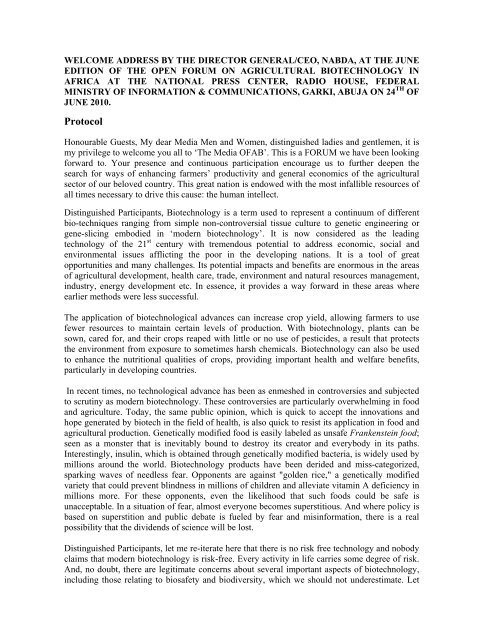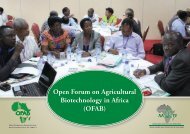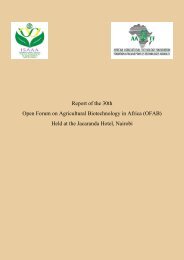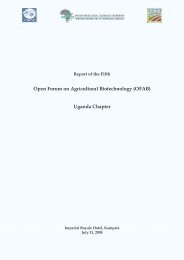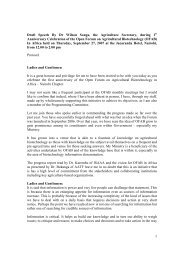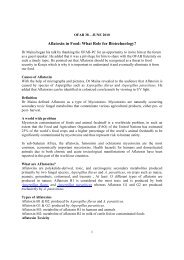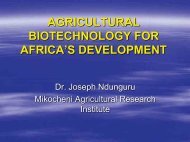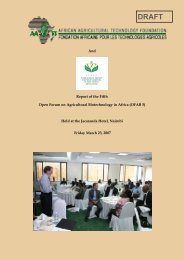address by the Director General/CEO, NABDA - OFAB
address by the Director General/CEO, NABDA - OFAB
address by the Director General/CEO, NABDA - OFAB
Create successful ePaper yourself
Turn your PDF publications into a flip-book with our unique Google optimized e-Paper software.
WELCOME ADDRESS BY THE DIRECTOR GENERAL/<strong>CEO</strong>, <strong>NABDA</strong>, AT THE JUNE<br />
EDITION OF THE OPEN FORUM ON AGRICULTURAL BIOTECHNOLOGY IN<br />
AFRICA AT THE NATIONAL PRESS CENTER, RADIO HOUSE, FEDERAL<br />
MINISTRY OF INFORMATION & COMMUNICATIONS, GARKI, ABUJA ON 24 TH OF<br />
JUNE 2010.<br />
Protocol<br />
Honourable Guests, My dear Media Men and Women, distinguished ladies and gentlemen, it is<br />
my privilege to welcome you all to ‘The Media <strong>OFAB</strong>’. This is a FORUM we have been looking<br />
forward to. Your presence and continuous participation encourage us to fur<strong>the</strong>r deepen <strong>the</strong><br />
search for ways of enhancing farmers’ productivity and general economics of <strong>the</strong> agricultural<br />
sector of our beloved country. This great nation is endowed with <strong>the</strong> most infallible resources of<br />
all times necessary to drive this cause: <strong>the</strong> human intellect.<br />
Distinguished Participants, Biotechnology is a term used to represent a continuum of different<br />
bio-techniques ranging from simple non-controversial tissue culture to genetic engineering or<br />
gene-slicing embodied in ‘modern biotechnology’. It is now considered as <strong>the</strong> leading<br />
technology of <strong>the</strong> 21 st century with tremendous potential to <strong>address</strong> economic, social and<br />
environmental issues afflicting <strong>the</strong> poor in <strong>the</strong> developing nations. It is a tool of great<br />
opportunities and many challenges. Its potential impacts and benefits are enormous in <strong>the</strong> areas<br />
of agricultural development, health care, trade, environment and natural resources management,<br />
industry, energy development etc. In essence, it provides a way forward in <strong>the</strong>se areas where<br />
earlier methods were less successful.<br />
The application of biotechnological advances can increase crop yield, allowing farmers to use<br />
fewer resources to maintain certain levels of production. With biotechnology, plants can be<br />
sown, cared for, and <strong>the</strong>ir crops reaped with little or no use of pesticides, a result that protects<br />
<strong>the</strong> environment from exposure to sometimes harsh chemicals. Biotechnology can also be used<br />
to enhance <strong>the</strong> nutritional qualities of crops, providing important health and welfare benefits,<br />
particularly in developing countries.<br />
In recent times, no technological advance has been as enmeshed in controversies and subjected<br />
to scrutiny as modern biotechnology. These controversies are particularly overwhelming in food<br />
and agriculture. Today, <strong>the</strong> same public opinion, which is quick to accept <strong>the</strong> innovations and<br />
hope generated <strong>by</strong> biotech in <strong>the</strong> field of health, is also quick to resist its application in food and<br />
agricultural production. Genetically modified food is easily labeled as unsafe Frankenstein food;<br />
seen as a monster that is inevitably bound to destroy its creator and everybody in its paths.<br />
Interestingly, insulin, which is obtained through genetically modified bacteria, is widely used <strong>by</strong><br />
millions around <strong>the</strong> world. Biotechnology products have been derided and miss-categorized,<br />
sparking waves of needless fear. Opponents are against "golden rice," a genetically modified<br />
variety that could prevent blindness in millions of children and alleviate vitamin A deficiency in<br />
millions more. For <strong>the</strong>se opponents, even <strong>the</strong> likelihood that such foods could be safe is<br />
unacceptable. In a situation of fear, almost everyone becomes superstitious. And where policy is<br />
based on superstition and public debate is fueled <strong>by</strong> fear and misinformation, <strong>the</strong>re is a real<br />
possibility that <strong>the</strong> dividends of science will be lost.<br />
Distinguished Participants, let me re-iterate here that <strong>the</strong>re is no risk free technology and nobody<br />
claims that modern biotechnology is risk-free. Every activity in life carries some degree of risk.<br />
And, no doubt, <strong>the</strong>re are legitimate concerns about several important aspects of biotechnology,<br />
including those relating to biosafety and biodiversity, which we should not underestimate. Let
<strong>the</strong>re be no doubt that we must take <strong>the</strong>se concerns very seriously. At <strong>the</strong> same time, let’s not<br />
forget that thousands of road fatalities are recorded in Nigeria every year but we still enjoy<br />
driving our cars. The fear of plane crash has not stopped us from flying. Many conventional<br />
crops cause allergic reactions, and yet, we accept <strong>the</strong>se risks and consume <strong>the</strong>se crops. We also<br />
accept that some foods are riskier than o<strong>the</strong>rs, and while we may handle <strong>the</strong>m with more care,<br />
we still eat <strong>the</strong>m. Genetic modification is not new. Ever since man turned from hunter-ga<strong>the</strong>rer<br />
into breeder and farmer, he has tamed animals and plants and altered -- sometimes deliberately --<br />
<strong>the</strong>ir genetic makeup.<br />
Therefore, agricultural practices have not been "natural” for 10,000 years. With <strong>the</strong> exception of<br />
wild berries and wild mushrooms, virtually all <strong>the</strong> grains, fruits and vegetables we eat today<br />
(including "organic" ones) are, strictly speaking, genetically modified. Potatoes, tomatoes, oats,<br />
rice and corns, for example, are derived from plants created during <strong>the</strong> past half-century <strong>by</strong><br />
extensive cross hybridizations that transcend natural breeding boundaries. For more than a<br />
decade, farmers have cultivated gene-spliced plants on more than 100 million acres annually and<br />
not a single ecosystem has been disrupted, or person injured, <strong>by</strong> any gene-spliced product.<br />
My dear Press members, through guided interactions with bio-scientists as we are doing here<br />
today, you will learn to uncover that which is covered. This will help you convince yourselves<br />
that <strong>the</strong>re is nothing mystic about modern biotechnology and that <strong>the</strong>re is nothing to hide for that<br />
matter. We want your coverage of biotechnology issues to be regarded as nothing but <strong>the</strong> truth,<br />
based on scientific knowledge and information<br />
The significance of Modern Biotechnology in Agriculture especially cannot be overemphasized<br />
especially, in its strong potential to alleviate hunger, food insecurity, and malnutrition as well as<br />
improve agricultural practices. The safe practice of this technology is <strong>the</strong>refore paramount as it<br />
is to any task, reason for <strong>the</strong> saying “it’s better to be safe than sorry”. This brings us to <strong>the</strong><br />
issue of <strong>the</strong> ‘Regulation of Biotechnology’ to ensure safe practice which is our topic of today.<br />
National Biosafety bill was drafted <strong>by</strong> <strong>the</strong> Federal Ministry of Environment in 2006 and was<br />
presented to <strong>the</strong> House of Representative as a privately sponsored bill <strong>by</strong> Hon. Gbenga P.<br />
Makanjuola. It is awaiting final reading now. Today, <strong>NABDA</strong> is a forerunner in <strong>the</strong> facilitation<br />
process of <strong>the</strong> bill passage just to ensure <strong>the</strong> safe practice of this cutting edge technology.<br />
Since <strong>the</strong> decision to establish <strong>the</strong> National Biotechnology Development Agency (<strong>NABDA</strong>), in<br />
2001 <strong>by</strong> <strong>the</strong> Federal Government of Nigeria to promote <strong>the</strong> biotechnology activities that<br />
positively respond to national aspiration on food security, job/wealth creation, affordable<br />
healthcare delivery and sustainable environment is because of <strong>the</strong> potential of <strong>the</strong><br />
Biotechnological tools in National Development hence immense contribution to <strong>the</strong> GDP of <strong>the</strong><br />
country. The activities of <strong>the</strong> National Biotechnology Development Agency (<strong>NABDA</strong>) through<br />
<strong>the</strong> Federal Ministry of Science & Technology over <strong>the</strong> years have spanned both formal and<br />
informal sectors of <strong>the</strong> economy.<br />
The Agency since its inception has contributed to <strong>the</strong> empowerment of Nigerian youth and<br />
women most especially <strong>the</strong> youth and women of <strong>the</strong> Niger Delta region of <strong>the</strong> country in<br />
collaboration with <strong>the</strong> Niger Delta Development Commission (NDDC) through training and<br />
empowerment schemes in ventures that do not require huge initial capital such as establishment<br />
of grasscutter rearing facility, aqua culture, tissue culture facility and mushroom production. The<br />
agency has also achieved giant stride in <strong>the</strong> following areas:
i. Establishment of Trinitron Nigeria Limited for <strong>the</strong> production of <strong>the</strong> 21 st century<br />
diagnostic kits for HIV, pregnancy and malaria. This initiative is in collaboration with<br />
<strong>the</strong> Trinity Biotech of Ireland (foreign partner) and Federal Ministry of Health.<br />
ii. Development of six centers of excellence in <strong>the</strong> first generation universities in <strong>the</strong> six<br />
geopolitical zones of <strong>the</strong> country for research and development (R & D) in<br />
biotechnology. These centers are being equipped with <strong>the</strong> state of <strong>the</strong> art biotech<br />
equipment ready for use <strong>by</strong> <strong>the</strong> researchers.<br />
iii. Promotions of various Presidential Initiatives on various Nigerian crops such Cassava,<br />
Rice, Maize, Cotton and Tropical fruits<br />
iv. Development of indigenous Bioreactor Systems, Ecological Sanitation (ECOSAN),<br />
National Youth Corps empowerment Schemes, Bioresources conservation and<br />
Biodiversity identification.<br />
v. Development of Transgenic Cassava, Cowpea and Sorghum, Maize and Rice in<br />
collaboration with both local and international Organizations such as African<br />
Agricultural Technology Foundation (AATF), Africa Harvest (AHBI), Institute of<br />
Agricultural Research (IAR), Zaria, Biocassava Plus and National Root Crop Research<br />
Institute (NRCRI) Umudike, Abia State.<br />
vi. Successful development of Transgenic fish technology for <strong>the</strong> production of transgenic<br />
Tilapia for desirable traits such as faster growth, resistance to disease, resistance to viral<br />
infections and to freezing temperature at <strong>the</strong> National Institutes for Freshwater Fisheries,<br />
New Bussa, Niger State.<br />
vii. Establishment of a Level 2 Containment Facility at IAR. Zaria for contained trial of<br />
transgenic crops e.g. sorghum, cowpea and cotton.<br />
.<br />
With all of you being drawn from different media organizations, <strong>the</strong> outcomes of this month’s<br />
edition of <strong>OFAB</strong>, I believe, will resonate throughout Nigeria if adequately reported and will help<br />
to clarify <strong>the</strong> controversial issues in agricultural biotechnology. The fact that this June Edition of<br />
<strong>OFAB</strong> is devoted specifically to <strong>the</strong> media practitioners testifies to <strong>the</strong> significant role you play<br />
in <strong>the</strong> whole biotechnology debate; we neglect your impact and output at our own peril. The<br />
"Pen, as you know, is mightier than sword”. Journalists are key partners in <strong>the</strong> development,<br />
transfer and application of any modern technology and that <strong>the</strong>y must not be neglected at all<br />
stages of adoption of any of <strong>the</strong>se technologies. This month’s edition of <strong>OFAB</strong> <strong>the</strong>refore, is<br />
based on a simple premise that if journalists understand <strong>the</strong> truth about biotechnology, <strong>the</strong>n, <strong>the</strong>y<br />
would be able to report more accurately in a manner that clarifies controversial issues.<br />
At this juncture, I wish to commend <strong>the</strong> legislators (especially, <strong>the</strong> Chairman, House Committee<br />
on Agriculture, Hon. Makanjuola Gbenga Peter) that have complemented our efforts on <strong>the</strong><br />
passage of <strong>the</strong> biosafety bill which is awaiting final reading at <strong>the</strong> House of Representatives. I<br />
applaud <strong>the</strong> efforts of <strong>the</strong> Nigerian Bio safety Committee for this important mile stone. I must<br />
also appreciate <strong>the</strong> Honourable Minister of Science and Technology and <strong>the</strong> entire Ministry for<br />
<strong>the</strong>ir understanding on this issue and his resolve to ensure our success. Most of all, I thank <strong>the</strong><br />
Honourable Ministers of Information & Communications, Agriculture & Rural Development<br />
and <strong>the</strong> Environment for your tremendous support in seeing to biotechnology having a<br />
regulatory framework in place.<br />
I have strong expectations that <strong>the</strong> interactive session that follows <strong>the</strong> Guest Speaker’s<br />
presentation will help achieve this goal. Therefore, it will be our collective duty to shift <strong>the</strong><br />
debate over genetically modified organisms to a more balanced and scientific plane, to dissipate<br />
and dissolve <strong>the</strong> persisting fear about biotech and help factor modern biotechnology into<br />
Nigeria’s development process. We cannot afford to be left behind. It may interest <strong>the</strong>
iotechnology community to know that, European countries, once <strong>the</strong> hardest critics of G.M<br />
food in <strong>the</strong> world have just approved <strong>the</strong> cultivation of first GM Crop Amflora potato in Europe<br />
for industrial purposes alongside <strong>the</strong> entry of 3 GM Maize products. This approval came after 13<br />
years of waiting. This is a giant stride in <strong>the</strong> modern biotech world, and definitely an<br />
encouragement to us at <strong>NABDA</strong> that we are not leading <strong>the</strong> Nigerian government and <strong>the</strong> good<br />
people of Nigeria astray.<br />
I wish you a successful deliberation.<br />
Thank you and God bless Nigeria.<br />
Professor Bamidele Ogbe Solomon<br />
<strong>Director</strong> <strong>General</strong>/<strong>CEO</strong>


